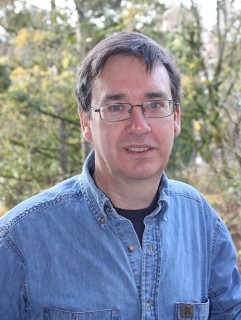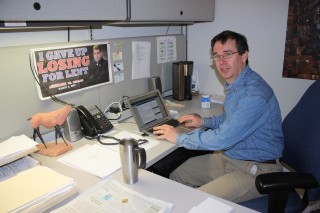This content was published: February 28, 2014. Phone numbers, email addresses, and other information may have changed.
Business faculty member shares experience as part of college’s strategic planning
Story by Kate Chester. Photo by James Hill.
Phil Seder, chair of the Business Department at the Sylvania Campus, sees his service on the college’s Strategic Planning Steering Committee as an opportunity to contribute to the creation of PCC’s future trajectory. The college has led the strategic planning process since the start of the academic year. Its steering committee – made up of staff and faculty from throughout the district – is helping to define a plan to best serve students and the community at large, now and over the next five years. The process will result in the creation of a strategic plan later this year that will be revisited annually and used frequently to guide PCC in decision-making.
The following is a question-and-answer with Seder about his experience on the steering committee and what strategic planning means for the college.
What is your professional role at the College?
Seder: Department Chair Business, Sylvania Campus.
What is your role as part of the Strategic Planning Committee?
Seder: I’m a ‘plain old committee member.” In that role I hope to give a voice to certain common beliefs and practices in the business community, as well as remind the group about the need to seek outside validation for our beliefs and attitudes. I like to discuss what I see as the ‘three legs of our stool’ – students, transfer institutions and employers.
What has the group covered so far in terms of discussion topics?
Seder: The definition of strategy; the difference between strategy and tactics and questions like, “What is the SWOT (Strengths, Weaknesses, Opportunities and Threats) for PCC?” “What are PCC’s competitive advantages?” and “What does the group think the five to seven big areas of strategic focus are for the college?”
What have you learned personally as an active member in the Strategic Planning process?
Seder: I always find it interesting to be exposed to other voices within the college; it’s easy to get comfortable and not stray far from your specialty. Some ideas I may not agree with and most likely never will. Other voices and ideas slowly turn me toward a new way of looking at things – and that is an interesting experience.
What do you hope PCC will be able to accomplish/aspire to as a result of this work?
Seder: I personally think there are several converging forces that will vastly change the landscape of education over the next decade. They include on-line learning, globalization and an erosion of support for lifelong tenured careers. Both the institution and the professionals within it need to chart a course through these troubled waters to avoid becoming lost.
Why should a faculty member or a student care about Strategic Planning? What’s “in it” for them?
Seder: My guess is that the process will not result in sudden blows to faculty or students but will result instead in shifts that will take place over the next several years. Some of these shifts will present opportunities while others will demand adjustment. For example, perhaps we will be asked to undertake more training. Perhaps more resources will go into student advising – and be taken from other areas. There will, in any event, be changes in the working environment that all members of the community should care about.
Personal Biography – Phil Seder:
- Date Joined PCC: 2005
- Hometown: Eugene, Ore.
- College and Degrees: Lane Community College, Portland State University, University of Oregon (B.S. Business – Logistics), Columbia University (M.B.A. – Marketing, Finance, International Business)
- Life Experience: 15 years in global high tech management, 14 patents related to digital image processing and six years with the Peace Corps, including two volunteer years in Africa and four years in administration.




Phil describes a few major macro-level changes in education and the workplace and I’m eager to hear about connecting these themes at the local level. I’m glad he’s part of the committee. I appreciate this format – the profiles on planning committee members. It helps to understand more about the perspectives of those involved.